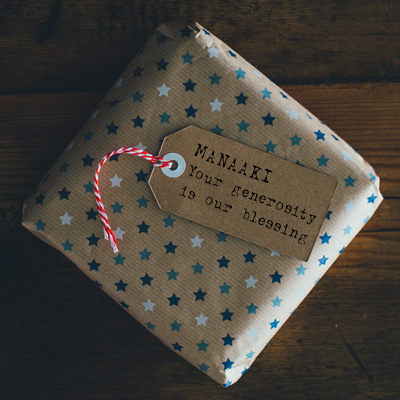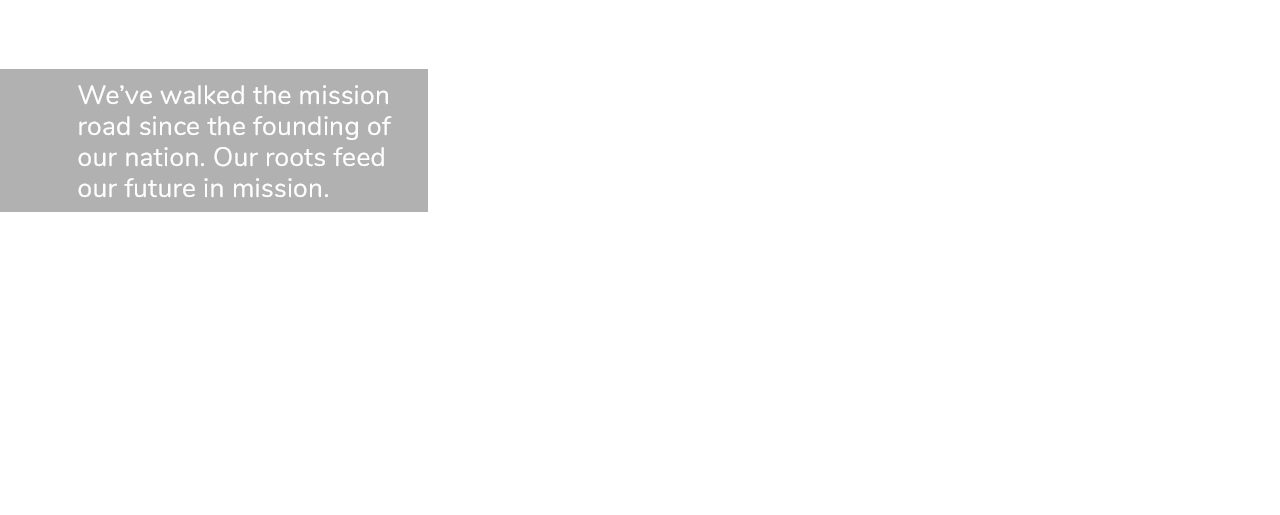
Missions Interlink New Zealand is the association of mission organisations and mission passionate people in Aotearoa New Zealand. Our membership of more than 100 organisations, churches and individuals represent approximately 1,500 workers in mission from and within Aotearoa New Zealand. We are but one of many national and regional evangelical missions associations around the world. See our Global page for links to our partners worldwide.
Missions Interlink New Zealand exists to facilitate collaboration to increase participation in mission from and within Aotearoa NZ. This core purpose of intent draws from the very DNA of our nation. Our logo expresses this in the centrifugal spin of the O, with colours representing the whenua|land (green), tangata|people (orange) and wairua|Spirit (cyan) that launches Kiwis to be a blessing to the nations with what they have been blessed with in “Godzone” (a term abbreviated from the Thomas Bracken poem, God’s Own Country).
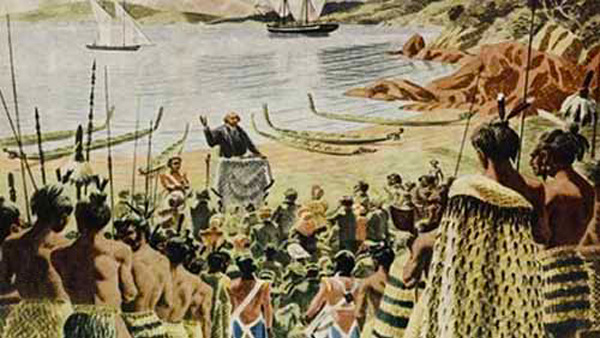
A (1948) artist’s impression of Samuel Marsden preaching the first sermon in Aotearoa on Christmas Day 1814, accompanied by rangatira (very respected) Ruatara, heir apparent to Chief Te Pahi, whom Marsden met in New South Wales in the early 1800’s.
Roots
Missions Interlink NZ was established in October 1972 as the NZ Evangelical Missionary Alliance, a sister organisation to the NZ Evangelical Alliance (now known as the New Zealand Christian Network). But our whakapapa (heritage) reaches back to the very founding of our nation as it was formed under the British Commonwealth. Mission work everywhere receives mixed reviews, but as Robert Woodberry has pointed out, protestant missions have by and large had a positive socio-economic and political influence on nations that embraced them, and New Zealand would be chief among those. Aotearoa New Zealand is a nation that was tempered in its founding through missionary counsel and forged by notable missionaries, Colonial and Maori alike, who helped to mitigate selfish excesses (by both first-peoples and colonists) to form a new civil society. No, it was not perfect, but it could have been much worse.
Shoots
What we have grown to understand and learn in Aotearoa New Zealand, that which has shaped our beliefs, we have taken to the nations as shoots from a gospel rooted here. It may not be readily apparent, but the gospel seed planted in this nation grew uniquely in our soil – as it grows uniquely in the soil of every nation. The gospel of which we tell is of a Lord Jesus who is a great peace bringer, a harmoniser of differences, the Lord of the creation we feel deeply connected to. Our understanding of the Christian gospel bears witness to the power and possibility of reconciliation, the importance of equality and the need to wrestle, with perseverance, to seek justice (which we interpret through the lens of ‘fairness’). From the earliest days of colonial visitation, our first-peoples (Māori) showed this emerging nation what it means to be generous, to share and hold things in common. This was misunderstood by many of the colonists but it was still woven into our national psyche, our core values. These values and more have strongly influenced mission from and within Aotearoa New Zealand and the gospel we share abroad.
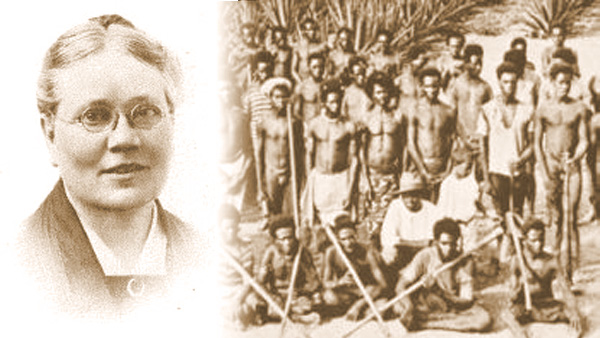
Florence Young was a passionate single woman bred in the tiny township of Motueka at the top of the South Island. From there she eventually joined her brothers in Queensland in 1882 where she was confronted with the plight of the Melanesian “kanaks” working in the sugar cane fields. Dedicated to ‘salvation before education or civilization’, she founded a mission to Solomon Islanders that grew to establish the very large South Sea Evangelical Church in the Solomons and parts of Papua New Guinea.
The founding of Aotearoa New Zealand is marked by the Tiriti o Waitangi (the Treaty of Waitangi) established between Māori and the British Crown in 1840. The first overseas missionary committee was established here as early as 1859, and by 1887 Rosalie McGeorge (Baptist) became our first missionary sent beyond the Pacific. One year prior Motueka-born Florence Young founded a mission to Solomon Islanders that was to become the South Sea Evangelical Mission (now Pioneers). Ever more decedents of early settlers and later immigrants sensed a strong personal call to serve in overseas mission, and by the 1970’s we were the highest sender of missionaries (per capita) in the world. (See online source, Te Ara).
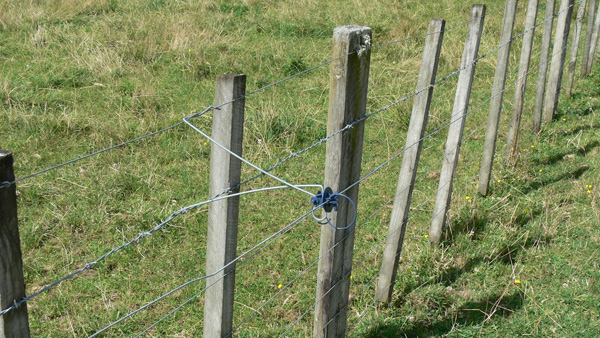
People bred in Aotearoa New Zealand (commonly called Kiwis) are known worldwide to be an innovative bunch. We pride ourselves on being able to resolve problems with minimal resources. This is popularly known as the “No. 8 wire” mentality because fencing wire has many more uses than simply keeping stock in (or out). These days duct tape has similar value. This down-to-earth can-do attitude is much appreciated around the world and very useful in mission work.
Contribution
After scanning the room, and in almost a whisper, a senior leader of the Evangelical Fellowship of Thailand leaned in and said “You must send more missionaries to Thailand, Kiwis make the best missionaries.” (World Evangelical Alliance General Assembly, Pattaya Thailand, 2008). While this is just one indigenous church leader’s perspective, we hear this sentiment repeated over and over again around the world at localised and global gatherings. We do not state this as a point of pride or in comparison to the very valid contribution missionaries from other nations bring, but there is something unique about our Kiwi contribution to the extension and strengthening of Christianity around the world that Missions Interlink acknowledges and promotes.
“Punching above our weight” is a boxing idiom that is deeply ingrained into the Kiwi (New Zealander) psyche. It is used so often it is one of our most beloved clichés. But it is more than just a cliché, it is core to our national mythos, our understanding of what it means to be Kiwi. It means we strive to do more with less and wherever that produces remarkable results, we celebrate it: the sporting arena, in business, in global politics, in science and technology, in humanitarian service. It takes little imagination to perceive how this mindset applies positively to many mission contexts.
One missionary to Papua New Guinea (of a previous generation) once remarked that he found US Americans spent money to save time, whereas Kiwis spent time to save money! This is an expression of our values. Other aspects of the Kiwi ethos that have been core to our mission methodology include:
- Innovative and highly creative thinking (often breaking ‘rules’ and conflicting with the status quo)
- Egalitarian mateship (which finds condescension and separation distasteful)
- Humanitarian compassion (resulting in practical social engagement)
- Global awareness (with 25% of Kiwis living overseas, we have the 2nd largest diaspora in the world after Ireland)
- Understated (a type of humility born of tough, pioneering, egalitarian origins – of all who call themselves Kiwis).
Arguably our most beloved national hero, Sir Edmund Hillary encapsulates the daring humanitarian contribution Kiwis make to the benefit of the wider world. But, while admirable, Sir Ed does not make for a sufficient role model for Christian mission. There is a critical spiritual element missing in social humanitarianism that must be an overt part of our local and global mission.
Vision
To be Christian mission, our engagement with the world requires a spirituality that is rooted and revealed in Christ. As Christian missionaries from Aotearoa New Zealand, we therefore serve in the world as Kiwis commissioned by Christ the King to be His ambassadors alongside those from other nations. We all serve this calling with the clear objective of helping people of all nations to become His disciples, for their benefit and the benefit of their families, communities and the creation they inhabit. This is extending God’s Kingdom – leading people into submission to the King, receptivity to His Spirit, and adaptation to His Kingdom values and ethos. This brings glory to God, which is the end-game of the mission of God [see this link for more about this idea].
As we look into possible futures, the one we want to see develop is where the Church of Aotearoa New Zealand once again becomes one of largest senders of missionaries per head of population.

There is a saying in Maori, Ka Mura Ka Muri (we walk backwards into the future), so our vision of the future is rooted in the narrative of our past. Even so, it does not stay there. We learn from past mistakes and lean into current realities. As a community of reflective practitioners in mission we listen to the Holy Spirit calling us forward, saying “na konei atu, ina tahuri koutou ki matau, ina tahuri ki maui.” (This is the way, left or right, walk in it – Isaiah 30:21b).
According to Missions Interlink’s 2016 survey, currently 0.5% of the Bible-believing, church-attending, Christian population of Aotearoa New Zealand is engaged in mission of a cross-cultural nature. That’s about 1,500 people out of a guesstimated practicing-Christian population of 300,000 (which is approximately 6% of our total population). Therefore, we currently have 0.033% of our total population involved in some form of cross-cultural mission. According to recent research, Palestine currently ranks as the largest sender of missionaries per head of population (0.34%) with Korea ranked 5th (0.1%). If we were to rank among them, the Church of Aotearoa New Zealand (Protestant, Catholic and Orthodox) would need to increase its missionary quota to over 4,500 Kiwis engaged in mission.
Calculations such as these (whether local or global) are notoriously difficult to prove concretely. There are likely many Kiwis involved in cross-cultural Christian mission from and within Aotearoa New Zealand who for some reason lie outside of the Missions Interlink community. We cannot speak for them, but we do represent the bulk of the missions community as a subset of the Evangelical/Protestant churches of Aotearoa New Zealand.
Anecdotal evidence suggests it is difficult enough today to find sufficient financial support to keep 1500 Kiwis in mission. The resources may exist within the Church but they are not currently being released to mission (whether local or global). One solution is for church attendees to be more generous. If we conservatively argued that a worker in mission required NZ$35,000 p/a in support, a required minimum budget for sending 4,500 Kiwis into mission service would require NZ$1.57million p/a in committed regular donations ($525 p/a per active-Christian).
While raising money for mission is not an impossible task, the lack of supply does force us to question our models of mission. While we continue to draw on the best of the past for our mission DNA, we do not necessarily need to continue to follow their methods of wealthy-patron supported charity. An historical survey of the growth of the global Christianity reveals that it has spread on the coattails of commerce. Today the Missions Interlink community is rethinking yesterday’s models to create tomorrow’s pathways for sending ever more Kiwis and Kiwi resources into mission service.

